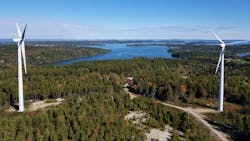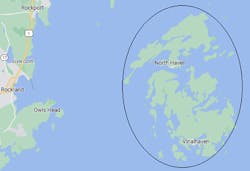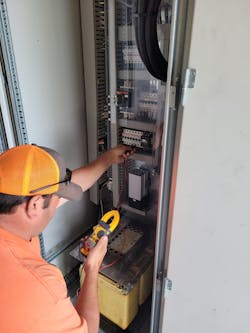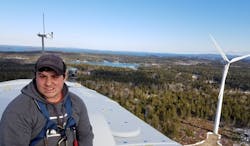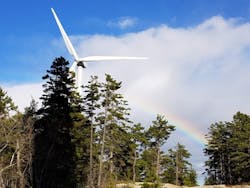In 2006, Fox Islands Electric Cooperative’s (FIEC) members voted to build their own wind farm and formed a for-profit subsidiary called Fox Islands Wind, LLC (FIW). At that time, electricity prices on the two islands served off the southern coast of Maine, were more than double the prices on the mainland and could be volatile due to the energy market in Maine.
Fast-forward to November 2009 when the cooperative became a leader in distributed wind energy, completing construction of its own wind farm, which became Maine’s first island wind project. The milestone project helped to stabilize power supplies and lower energy costs by producing local, renewable energy for rural lobster fishing communities, Vinalhaven and North Haven Islands. To date, it is still one of the East Coast’s largest community-owned wind projects.
The utility-owned wind energy project was one of nine distributed wind deployment case studies featured in NRECA’s Rural Area Distributed Wind Integration Network Development (RADWIND) project, supported by the U.S. Department of Energy’s Office of Energy Efficiency. The FIEC case study covers project financing, technical details on the wind farm, and lessons learned. In the report, Amy Watson Turner, FIEC’s CEO, describes the significance of the co-op’s “taking control over our own energy future.”
Operations and Maintenance
The wind farm is located on Vinalhaven Island, and connected via a two-mile, 3-phase 12.47 kV distribution line to a 10 MVA substation owned by FIEC. Condition monitoring is a key part of the wind farm operation and maintenance program, contracted to FIEC staff by FIW. FIEC crews perform routine turbine maintenance like oil changes, checking sound levels, and testing instrument controls. Line crews received field training on wind turbine maintenance at GE’s training facility in Schenectady, N.Y. FIW also has a maintenance agreement with GE Renewable Energy for twice yearly inspections and major service.
The reliability of the wind energy systems it a top priority for FIEC staff and field operation crews and condition monitoring is the key. CEO Turner says, “Generating local wind energy keeps us very much in charge of our own energy system which is particularly significant for island communities facing future energy uncertainty.”
Laura Moorefield, principal at Moorefield Research & Consulting, LLC, has more than 15 years’ experience in research, writing, and public speaking on energy policy, technology, and program design. Since 2005, Moorefield has been influential in the development of innovative programs and policies for state, federal, and international clients. Moorefield’s core focus now is on rural energy issues as a consultant to the National Rural Electric Cooperative Association (NRECA), rural utilities, and other related organizations.
About the Author
Laura Moorefield
Laura Moorefield, principal at Moorefield Research & Consulting, LLC, has more than 15 years’ experience in research, writing, and public speaking on energy policy, technology, and program design. Since 2005, Moorefield has been influential in the development of innovative programs and policies for state, federal, and international clients. Moorefield’s core focus now is on rural energy issues as a consultant to the National Rural Electric Cooperative Association (NRECA), rural utilities, and other related organizations.
